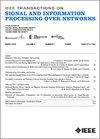Communication-Efficient and Privacy-Aware Distributed Learning
IF 3
3区 计算机科学
Q2 ENGINEERING, ELECTRICAL & ELECTRONIC
IEEE Transactions on Signal and Information Processing over Networks
Pub Date : 2023-10-11
DOI:10.1109/TSIPN.2023.3322783
引用次数: 0
Abstract
Communication efficiency and privacy are two key concerns in modern distributed computing systems. Towards this goal, this article proposes partial sharing private distributed learning (PPDL) algorithms that offer communication efficiency while preserving privacy, thus making them suitable for applications with limited resources in adversarial environments. First, we propose a noise injection-based PPDL algorithm that achieves communication efficiency by sharing only a fraction of the information at each consensus iteration and provides privacy by perturbing the information exchanged among neighbors. To further increase privacy, local information is randomly decomposed into private and public substates before sharing with the neighbors. This results in a decomposition- and noise-injection-based PPDL strategy in which only a freaction of the perturbeesd public substate is shared during local collaborations, whereas the private substate is updated locally without being shared. To determine the impact of communication savings and privacy preservation on the performance of distributed learning algorithms, we analyze the mean and mean-square convergence of the proposed algorithms. Moreover, we investigate the privacy of agents by characterizing privacy as the mean squared error of the estimate of private information at the honest-but-curious adversary. The analytical results show a tradeoff between communication efficiency and privacy in proposed PPDL algorithms, while decomposition- and noise-injection-based PPDL improves privacy compared to noise-injection-based PPDL. Lastly, numerical simulations corroborate the analytical findings.高效沟通和隐私意识分布式学习
通信效率和保密性是现代分布式计算系统的两个关键问题。为了实现这一目标,本文提出了部分共享私有分布式学习(PPDL)算法,该算法在保持隐私的同时提供通信效率,从而使其适用于对抗性环境中资源有限的应用程序。首先,我们提出了一种基于噪声注入的PPDL算法,该算法通过在每次共识迭代中仅共享一小部分信息来实现通信效率,并通过干扰邻居之间交换的信息来提供隐私。为了进一步提高隐私性,在与邻居共享之前,将本地信息随机分解为私有和公共子状态。这就产生了一种基于分解和噪声注入的PPDL策略,在该策略中,在局部协作期间,只有一小部分受扰动的公共子状态被共享,而私有子状态在本地更新而不被共享。为了确定通信节省和隐私保护对分布式学习算法性能的影响,我们分析了所提出算法的均值和均方收敛性。此外,我们通过将隐私描述为诚实但好奇的对手对私人信息估计的均方误差来研究代理的隐私。分析结果表明,所提出的PPDL算法在通信效率和隐私之间进行了权衡,而基于分解和噪声注入的PPDL比基于噪声注入的PPDL提高了隐私性。最后,数值模拟证实了分析结果。
本文章由计算机程序翻译,如有差异,请以英文原文为准。
求助全文
约1分钟内获得全文
求助全文
来源期刊

IEEE Transactions on Signal and Information Processing over Networks
Computer Science-Computer Networks and Communications
CiteScore
5.80
自引率
12.50%
发文量
56
期刊介绍:
The IEEE Transactions on Signal and Information Processing over Networks publishes high-quality papers that extend the classical notions of processing of signals defined over vector spaces (e.g. time and space) to processing of signals and information (data) defined over networks, potentially dynamically varying. In signal processing over networks, the topology of the network may define structural relationships in the data, or may constrain processing of the data. Topics include distributed algorithms for filtering, detection, estimation, adaptation and learning, model selection, data fusion, and diffusion or evolution of information over such networks, and applications of distributed signal processing.
 求助内容:
求助内容: 应助结果提醒方式:
应助结果提醒方式:


